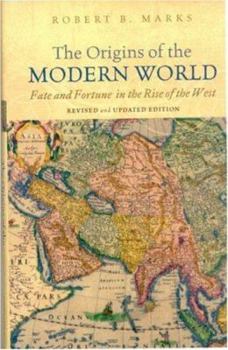The Origins of the Modern World: Fate and Fortune in the Rise of the West
This volume presents a global narrative of the origins of the modern world. Unlike most studies, which assume that the rise of the West is the story of the coming of the modern world, this history accords importance to the 'underdeveloped world'.
Format:Hardcover
Language:English
ISBN:074255418X
ISBN13:9780742554184
Release Date:December 2006
Publisher:Rowman & Littlefield Publishers
Length:220 Pages
Weight:1.15 lbs.
Dimensions:0.7" x 6.2" x 9.3"
Customer Reviews
1 rating
Can be read instead of a fat world history text, and profitably
Published by Thriftbooks.com User , 15 years ago
Marks's first edition of this book was the first well done and brief attempt to tell the story of the world from 1500-1900 in a way that showed connections between regions of the world, saw trading zones that crossed national boundaries, and put Europe in its rightful place as not a world powerhouse by any measurement one cares to use. In de-centralizing Europe, he can now focus on places like the Indian Ocean, an east Asian zone dominated by the Chinese, and he is free to follow the aspirations for world power that emerged in the early modern world. One grab for world power certainly came from Europeans producing sugar in the Americas and the Caribbean, leading to the massive slave trade (which, by the way, flies somewhat against his non-Eurocentric approach; he wriggles out of this by calling it one of the accidents of history that Europeans stumbled across sugar cane). The first and second editions try to bring in ecological explanations for major historical events such as the Industrial Revolution (coal being in abundance in England, for example), but that narrative is not fleshed out adequately. The story devolves back to politics, which is understandable and perhaps explains how the newest edition changes the book's subtitle. Here is how the book, so reasonably priced, can replace a standard textbook: It provides brief surveys of the major civilizations of the world. It connects the major civilizations through trade networks and cultural exchanges. It gives its attention to China and India as powerhouses in 1500-1900, appropriately. It is helpful on the Atlantic slave trade, the spread of Islam to Africa and Indonesia, and on the emerging European states' rise to prominence around 1800, thanks to industrialization, good agriculture, railroads, and mass produced goods. The book is not going to replace a textbook that can take more time and cover the world of ideas, say more about interesting cultural events in modern world history, and cover the last 150 years, a time when Marks is less comfortable. The rise of the US is not treated well, nor is Africa after the scramble was largely finished. However, the title is The Origins of the Modern World, so we can leave the events of the modern world for another book, and that's perfectly fine. Marks's thesis mirrors the thesis of Jared Diamond in Guns, Germs, and Steel, the DVD production of which could be a nice supplement to reading Marks's book. Bottomline: It is a quality book that does world history properly, without the old western civ bias. It gives the reader a glimpse at the ecological accidents of history that have drastically affected history. It is easy to read (if a bit driven by statistics). And the price is right. Plus, there is a good study guide with terms, essay questions, and website links on the publisher's website.






